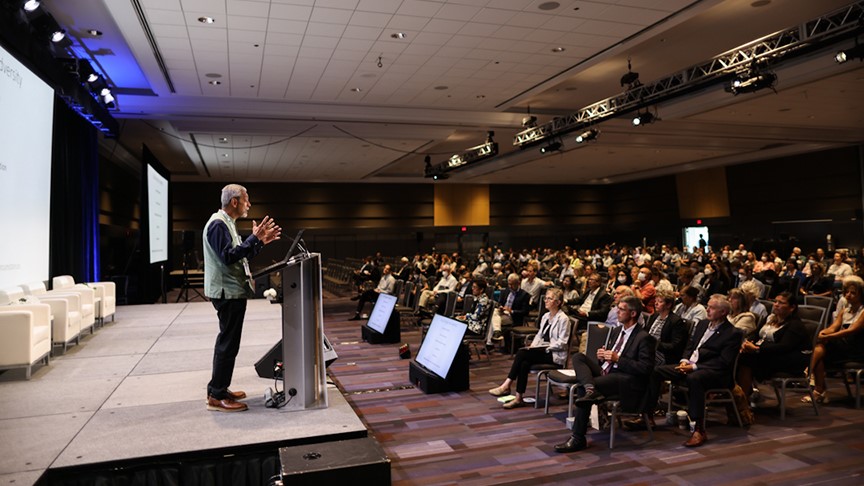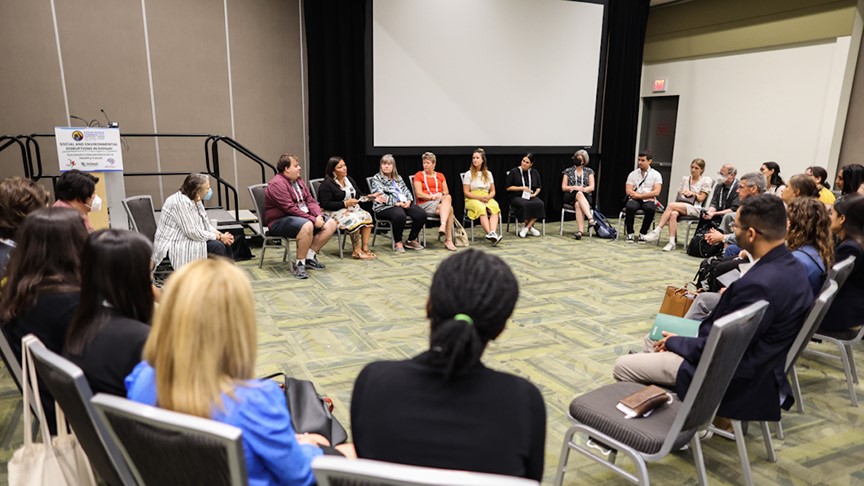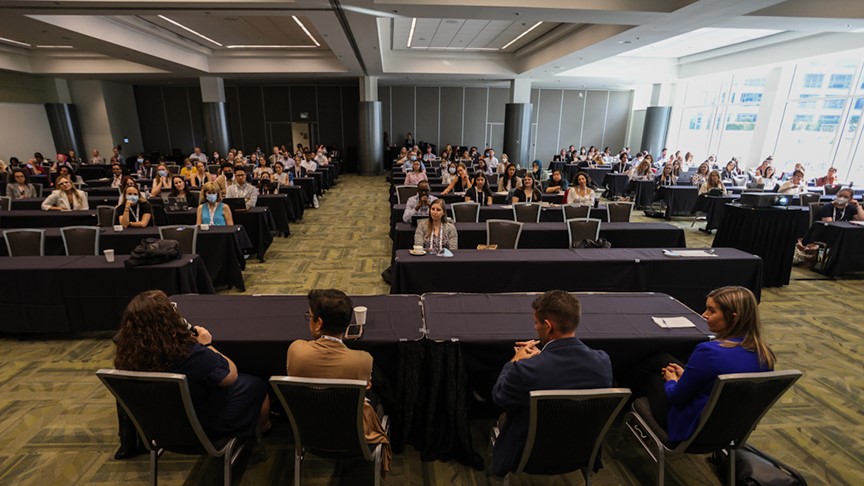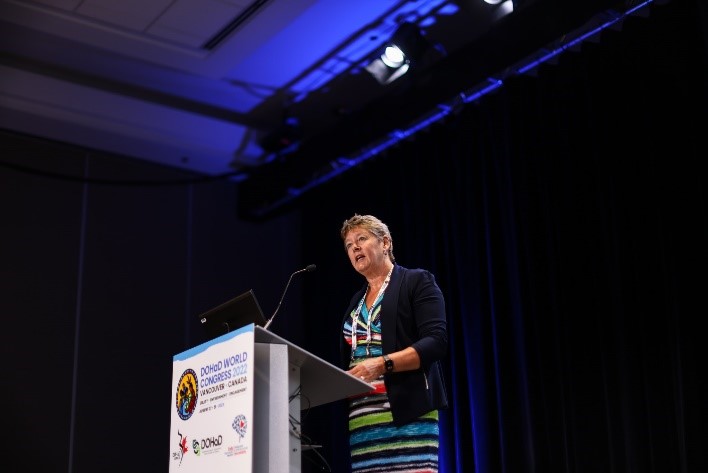
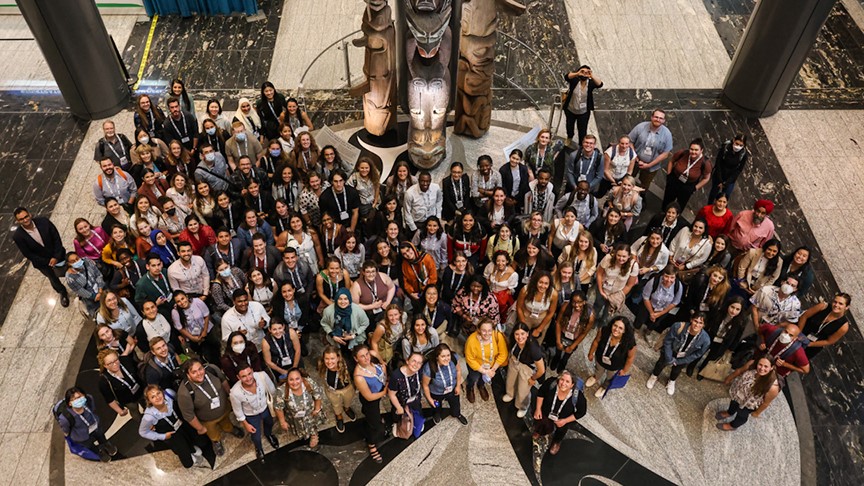 Kids Brain Health Network (KBHN) convenes global scientists with the International Society for Developmental Origins of Health and Disease (DOHaD)
Kids Brain Health Network (KBHN) convenes global scientists with the International Society for Developmental Origins of Health and Disease (DOHaD)
August 27-31, 2022
This summer, Kids Brain Health Network (KBHN) hosted a Network-wide gathering in person since December 2019.
Partnering with the International Society for Developmental Origins of Health and Disease (DOHaD) World Congress, KBHN held its 12th annual conference in Vancouver, where researchers, families and partners from across Canada gathered. The partnership with the DOHaD Congress expanded KBHN’s global audience and reach.
“Social and Environmental Disruptions in DOHaD” was the theme guiding everyone’s participation in the World Congress, with a particular emphasis on “Successful Interventions for A Healthy Future.” Participants joined from the Philippines, Pakistan, Australia, the Netherlands, and many more countries and Indigenous nations worldwide, sharing expertise across a vast range of developmental health sciences.
Welcoming the world to the Pacific Northwest Coast
Elder Margaret George was born in the Skawahlook First Nation, and lives within the Tsleil-Waututh community. During the spectacular opening ceremony, she welcomed Congress-goers to the unceded territories of the Coast Salish peoples—the Musqueam, Squamish and Tsleil-Waututh Indigenous nations who have lived for more than 10,000 years in the place colonially named Vancouver.
The Vancouver Convention Centre was packed full of leading researchers, academics, trainees, families, caregivers, and clinicians. Jean Duclos, the Health Minister of Canada, made a special mention of KBHN, acknowledging the work the Network has been doing to support children and families living with neurodevelopmental disabilities (NDDs). In doing so, Minister Duclos also named the government’s commitment to investing in initiatives that support children’s health and development.
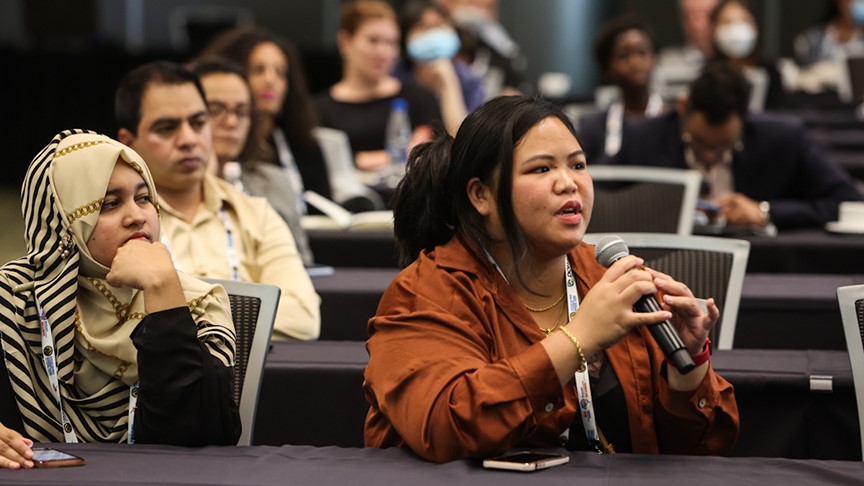 KBHN Board Chair, Geoff Pradella, was among the leaders who gave opening remarks. “In the coming days, we look forward to celebrating many projects and partnerships supporting developmental health,” said Geoff.
KBHN Board Chair, Geoff Pradella, was among the leaders who gave opening remarks. “In the coming days, we look forward to celebrating many projects and partnerships supporting developmental health,” said Geoff.
“We especially hope to learn and share ways of integrating equity, diversity and inclusiveness into our research and practices. By gathering as a global community, we have the power to effect real change for today’s children and families, and for many generations to come.”
The opening ceremony also featured live performances by Spakwus Slolem (translated as ”Eagle Song Dancers”) from the Squamish Nation, and young singers from the Sarah McLachlan School of music, keeping the audience entertained and in high spirits.
Building bridges between science, the public, and government
During the Open Public Panel, researchers and policymakers shared their expertise and perspectives on the impacts of pandemics and trauma on early childhood development.
Dr. Tessa Roseboom of the Netherlands emphasized the importance of investing in research and resources during the first 2,000 days of each child’s life, from conception to age five. Panel members drew attention to the roles of traumatic stresses for parents, babies and children, including warfare, disease, famine, drought and scarcity of essential resources.
Not to be overlooked are the huge inequities experienced by Indigenous people, refugees, migrants, immigrants, racialized groups, and those who are otherwise denied equity. Margo Greenwood of the Cree Nation spoke of the devastating and lasting impacts of the cultural genocide committed against Indigenous people and communities through the colonization of Canada.
These impacts are felt and expressed across generations, and Margo shared some ways that today’s generations of Indigenous people are bringing long-held cultural knowledge and strengths to lead healing initiatives.
Every panelist underscored the critical importance of integrating knowledge among scientific communities from all DOHaD disciplines. They also emphasized the urgent role of skilled science communicators in influencing public health policies to benefit all sectors of society.
Considering the calls to action for shaping public and political will through scientific knowledge, it was fitting that members of the public, researchers and policymakers were invited to participate and discuss issues facing people everywhere from the earliest stages of human development—in a world reshaped by the COVID-19 pandemic.
In the longstanding debate of “nature versus nurture,” the panel members were clear that the intersections between nature and nurture (DNA and genetics, as well as environment and epigenetic factors) are where the power lies to improve developmental health. The discussions arising during this event effectively framed much of the discourse in the following days of the DOHaD World Congress.
KBHN Keynote addresses: Childhood adversities
Dr. Vikram Patel’s keynote Fraser Mustard lecture also saw a full house for this KBHN-sponsored session “Acting early: From developmental science to the scalable prevention of mental health problems.” Dr. Patel emphasized the need for targeting environments in the early life course for children, to prevent mental health challenges. During key developmental periods, interventions from parents in the home environment, as well as schools and communities should take centre stage, according to Dr. Patel. He elaborated on the developmental ingredients for prevention: a life course approach from conception to young adulthood, an equity-focused population-based approach, and diverse community platforms for delivery of interventions to target social and environmental adversities.
Dr. Linda Richter joined the Congress virtually, from South Africa to deliver her keynote address “Childhood Adversity, Pandemics.” Dr. Richter has made major contributions to the impact of maternal and child undernutrition on adult health and human capital, studies of the developmental potential in the first five years for children in developing countries, and studies of inequality in early childhood.
Training the Next Generation of Neurodevelopmental Scientists
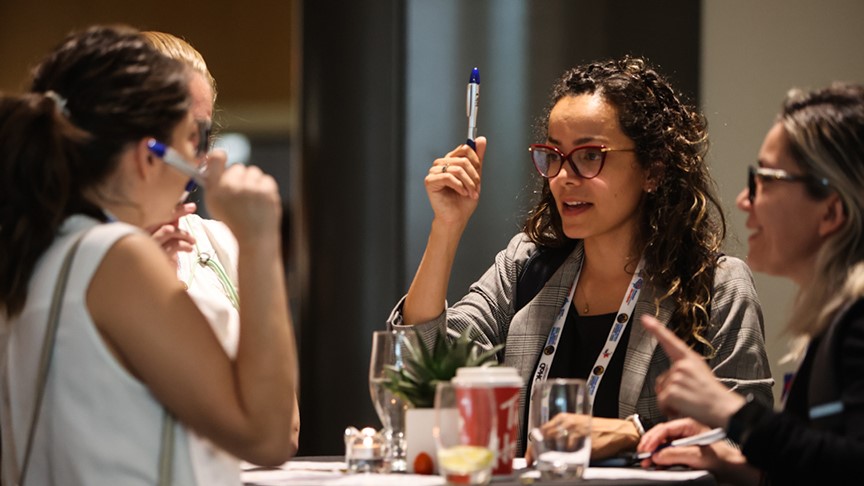 Among the neurodevelopmental scientists attending were 29 trainees who received travel awards from KBHN, making it financially accessible for them to attend and participate in the Congress. The trainees had many opportunities to learn and collaborate in person with delegates from diverse disciplines, while seven of them also brought in global perspectives from their home countries. The pre-Congress trainee programs had workshops with experts with insights and tools on topics as varied as social media ethics, writing for lay audiences, Big Data in DOHaD research and a career pathways session with a panel that included KBHN Deputy Science Officer, Jennifer Zwicker.
Among the neurodevelopmental scientists attending were 29 trainees who received travel awards from KBHN, making it financially accessible for them to attend and participate in the Congress. The trainees had many opportunities to learn and collaborate in person with delegates from diverse disciplines, while seven of them also brought in global perspectives from their home countries. The pre-Congress trainee programs had workshops with experts with insights and tools on topics as varied as social media ethics, writing for lay audiences, Big Data in DOHaD research and a career pathways session with a panel that included KBHN Deputy Science Officer, Jennifer Zwicker.
The KBHN Policy Advisory Research Training (PART) Committee team organized and hosted every trainee networking event throughout the Congress. They showed their hospitality through an evening social with a game of BINGO, and an exploration of downtown Vancouver’s sights. They also supported peer engagement with a Career Pathways workshop, and a DOHaD Connector event to encourage cross-functional learning.
Indigenous Communities in DOHaD Research
Indigenous leaders present at the Congress shared the importance of language in shaping our perspectives and relationships—within official sessions like the “Indigenous Community in DOHaD Research” panel, and in dialogues throughout.
KBHN is learning that the expression “allyship” is more equitably framed as “partnership.” Terms like “assessment” may feel intrusive, and words like “stakeholders” deny the sovereignty of Indigenous people as rights holders, whose rights are protected under the Constitution of Canada.
In a session with Indigenous community partners and Elders, Amber King-Robitaille of Beausoleil First Nation and Arlene Haché, executive director of Keepers of the Circle, Dr. Chaya Kulkarni said: “Indigenous Peoples are the ones changing the mental health conversation in Canada. Nurturing the Seed is being met with success due to the longstanding relations between IEMH (the Infant and Early Mental Health Hub), KBHN (the program funder), Queens University and 12 project partner sites and the guidance from Elders.” The session ended with a circle of trust, when the audience and the presenters came together to form a ring, sharing thoughts and perspectives on the Nurturing the Seed program.
Research Ingenuity & Collaboration on Display
Trainees and researchers supported by KBHN presented more than two dozen posters during the course of the conference across the themes of autism and e-health, incorporating diversity in knowledge translation tools to increase family engagement in research. There were poster presentations from KBHN-funded projects such as Physical Activity Program (formerly Kids Action Coaching), System Navigation, Better Nights Better Days, Sound Sensitivity and Dino Island, along with many more.
The KBHN display booth in the exhibition hall was a busy hub for Network members to meet and connect with one another, collect KBHN information and keepsakes, while also providing a public-facing presence for Canadian neurodevelopmental science and research accessible to all DOHaD Congress delegates.
Inspiring Speakers
KBHN sponsored three symposia at the Congress, focusing on areas of specific interest in the field of neurodevelopmental research:
- Early brain development and the origins of infant mental health
- Applications of artificial intelligence (AI) to improve health outcomes across the lifespan
- Social determinants of DOHaD: health inequities, immigrations, racism, and sexism
Dr. François Bolduc of the University of Alberta—a former KBHN-supported researcher—described his efforts to create an AI-powered chatbot that finds sound medical advice and the most valuable available interventions for people with NDDs and their families. Much like Apple’s Siri or Amazon’s Alexa, it will respond to text or voice inputs from users. Unlike these chatbots, it will focus on information from reliable sources. All the presenters using artificial intelligence to improve health outcomes across the lifespan shared a common sentiment: For everything it can do, AI has its limits, and families will always need a human touch as well.
The Presidential Plenary sessions also saw an enthusiastic turnout, co-chaired by Janet Rossant, president of Gairdner Canada, and Dr. James Reynolds, Chief Scientific Officer of KBHN. Presenters shared their nuanced findings about pregnancy and birth, and the implications of parental Type 2 diabetes and cardiovascular disease, gestational diabetes, fetal liver gene expression and growth restriction, and birth outcomes during pandemic lockdowns.
Genevieve Currie and Vanessa Joly, both KBHN trainees, had the opportunity to present their work to the Congress audiences. On the topic of neurodevelopmental disabilities (NDDs) and mental health, Genvevieve discussed mental health challenges faced by children living with NDDs and their families during COVID-19.
Among presentations on DOHaD, knowledge translation and education, Vanessa shared the COMPASS framework (client-oriented mapping for point of care access to supports and services) as a tool for navigating the journey to effective supports and interventions for Fetal Alcohol Spectrum Disorder (FASD).
The Family Engagement in Research (FER) team, represented by Alice Soper and funded by KBHN, received waves of positive feedback for their program’s approach to inclusivity and engagement from the start. Alice shared examples of the FER team’s strategies for involving family members as equal partners from the start, and throughout the research process.
Nicola Lewis, CEO of KBHN, took the stage to thank the Congress Co-Chairs—John Challis and Janice Bailey—along with the entire team who worked together to make this impressive five-day event a reality.
Ending the DOHaD World Congress on an inspiring note, Nicola emphasized the importance of sharing research and experiences from diverse perspectives, and learning from one another to better integrate equity, accessibility and inclusiveness in developmental health sciences. “When it comes to research excellence, and enacting change for the better, we can’t forget that relationships are at the very heart of our work,” she said. “We hope you have gained new insights, developed new connections, and nurtured the potential for new and groundbreaking partnerships and projects to come.”
Read more about KBHN’s COVID-19 Research Initiatives
While research on the effects of the COVID-19 pandemic is in its infancy, KBHN and Mitacs anticipated calls to action by fast-tracking solutions in Canada since September 2020. Together, they continue to fund and support community-based research to mitigate the evolving challenges frontline organizations face in supporting children and families living with neurodevelopmental disabilities, through the pandemic and its continuing legacy.
The Kids Brain Health Network is a Member of Research Canada: An Alliance for Health Discovery.
Visit rc-rc.ca to learn more.

